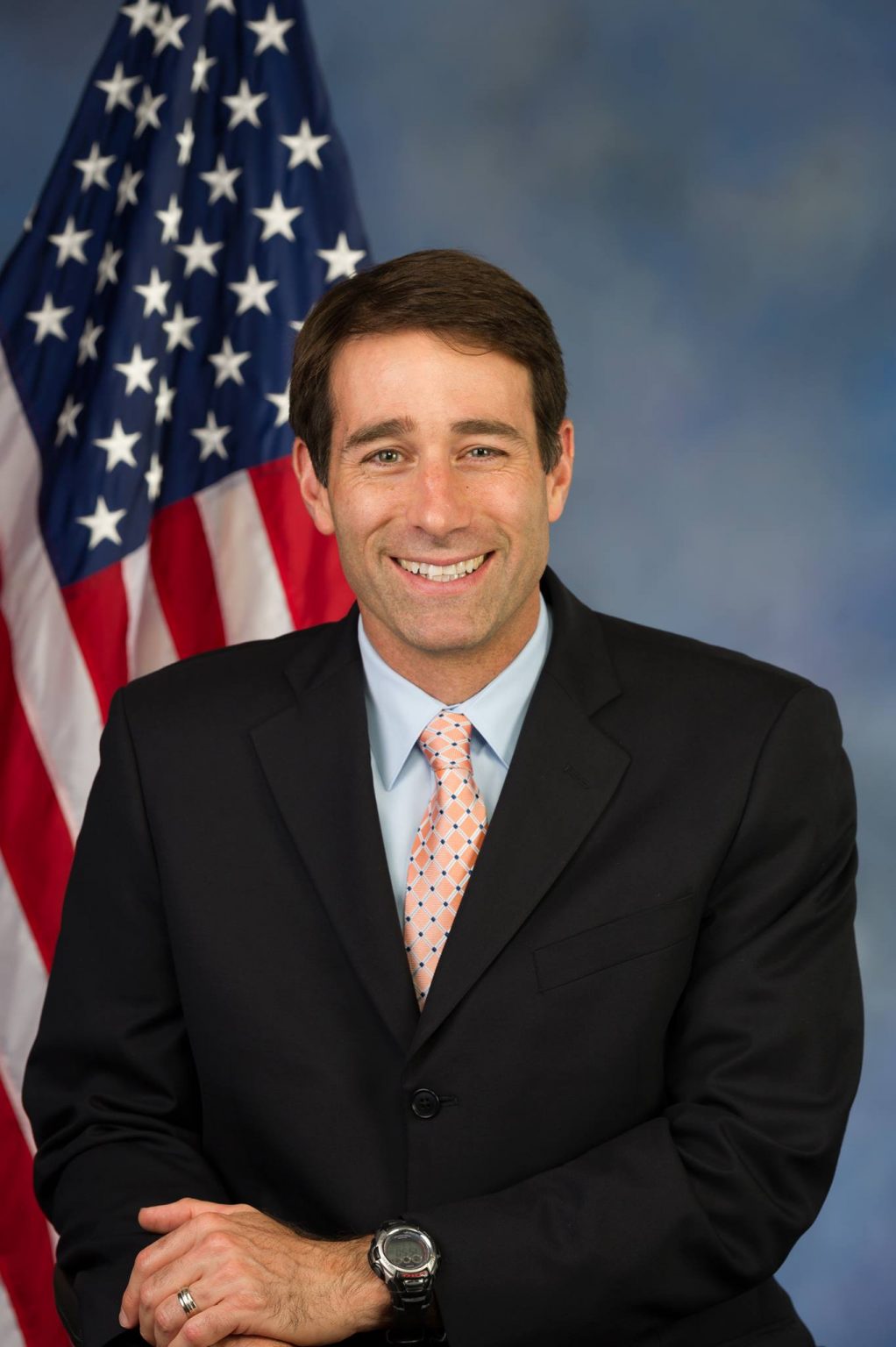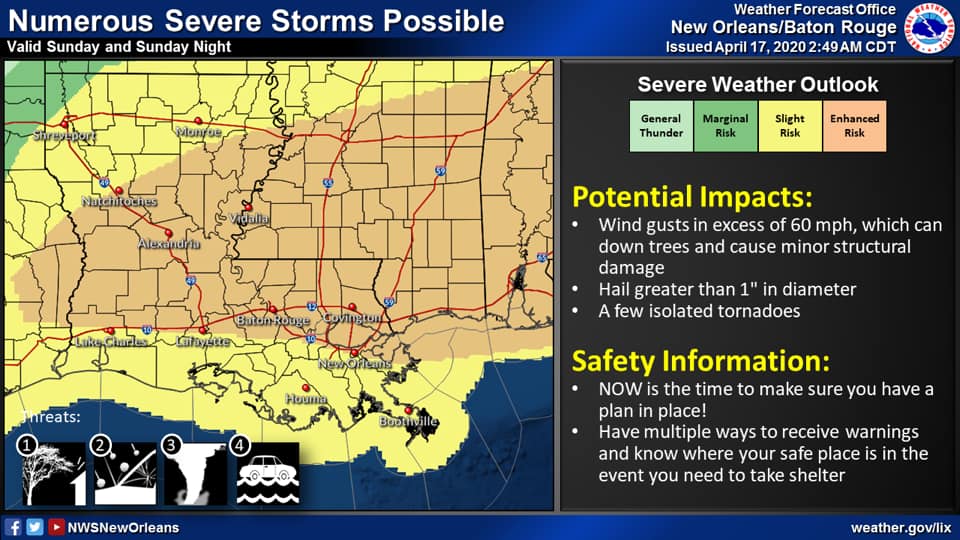
Want to chat with your Congressman? Graves will host a Facebook Live to Discuss COVID-19 Updates and News
April 16, 2020
Potential Severe Weather this Weekend, GOHSEP warns
April 17, 2020By Justin T. Ward, Pamela Fussell and Renee Moise
Welcome to the age of COVID-19, a time in which terms such as “social distancing” and “flattening the curve” have become important parts of our daily conversations. In a matter of weeks, our way of life has been transformed, and every moment of every day carries a reminder of just how far away we are from our social norms. There are lines to enter grocery stores whose shelves are devoid of cleaning supplies and toilet paper. Dining rooms sit empty at local restaurants, but their telephones ring off the hook. Fitness centers, bars, casinos, and other “non-essential” businesses have not seen a patron in weeks.
In the midst of this quiet chaos, the 2019-2020 school year has come to an unceremonious end. When Louisiana’s teachers and students left the comfort of their classrooms, hallways, and playgrounds on Friday, March 13, it was with the understanding that this would be just a temporary, though unusual, pause. Few believed that the very structured process of closing a school term would be so affected by a virus, but here we are, and the loss is strong.
See, for a teacher, there is just something special about the end of a school year. For the first time all year, everything just seems to make sense, and everyone just gets along. Some say it’s because we’re all excited to start counting down the days to summer, but I like to believe it’s because, for once, trust and familiarity exist in the classroom at a level never felt before during the year. When a class is deathly silent, you know it’s because they’re listening intently, not because they’re bored out of their minds. When a girl rolls her eyes at you, you can tell her that you hope they get stuck that away without worrying that you might’ve hurt her feelings. She’ll giggle, and whatever had her rolling her eyes to begin with is suddenly not a big deal anymore.
When a boy makes his first A of the year in May, you find yourself overcome with emotion when it’s time to show it to him. A wide-eyed smile forms on his face, and you tell him that you knew he had it in him all along. Even though you’ve gone through this scene dozens of times before, you’ve never gone through it with THIS kid, and that makes it different and just as exciting as the very first time it ever happened.
There are inside jokes, there are reminiscences, and there are shouts of “Wait, remember when we learned about that at the beginning of the year?” There are times when you cannot continue to teach because you are just laughing so uncontrollably hard. On a personal level, my students actually start to appreciate and look forward to Country/Western Wednesday. Dolly Parton is requested constantly.
Beyond the four walls of the classroom, that “glory days” feeling permeates throughout the entire high school campus. There’s just so much happening! Every other day, you can walk to the baseball field or the softball field or the tennis court to watch your goofy students become warriors when it’s time to compete. They put forth their best effort, and when all is said and done, they sometimes run to give you that first sweaty post-game hug. “Thanks for coming,” they say, and you tell them that there was nowhere else that you would have been.
It is a time for recognition as awards ceremonies celebrating the best and the brightest in both athletics and academics are held. Certificates and varsity letters are presented, trophies and plaques are taken home, and letters of recommendation are written. Our kids clean themselves up for these events, as well as ring ceremony and prom, and we teachers are always amazed at how transformed our young women and men truly are. We begin to see them not for the faults they often displayed in our classrooms but for the strengths that will carry them into adulthood.
For our seniors, the end of the year is a culmination of so many hours, days, and weeks of hard work. For over a decade, they toil in our schools, enjoying the highest highs and suffering the lowest lows. They grow together and apart, and they learn so much about themselves. When senior year draws to a close, they stand on the cusp of completion. Everything they’d been fighting for now belongs to them. They’ve earned the diploma, and they’ve earned the cap and gown. They’ve earned a night where they are the stars, where hundreds of family and friends gather to honor them. We hug them, we cry with them, and we promise to stay in touch as they whisk away to new lives. No longer are they our high school students. They become our “real world” peers.
All of this and more is at the heart of the end of the average school year, but this year, in an instant, went from average to uncertain. Those little rituals that many us of take for granted hang in jeopardy, and we are plagued with so many questions that just do not have answers at this time. Will we go back? If so, when? Will there be more grades? Some kids need just one more chance to bump that GPA up. Will they get it? Will there be enough time for prom? What will it look like with only a few weeks’ notice? Surely, there will be a graduation ceremony, but when? Will we launch a group of kids into the “real world” just a week before taking in for the start of a whole new year?
Those questions have begun to run through the minds of everyone who has a high schooler in their lives, but for us teachers, there are even more. There’s that boy who is always first in the lunch line. Is he getting enough food at home? What about that girl who is always at odds with her family? Is she coming out of her room often enough to get fresh air? We have so many kids who work for what are now called “essential businesses.” Are they okay? Each day, they’re faced with a public who is angry, frustrated, and not always kind. Are they seeing the lessons to be learned from this situation, or have they reached their breaking points? Are they washing their hands enough?
As the viral hurricane that is COVID-19 makes landfall in our neighborhoods and homes, it leaves its own type of devastation in its wake. It won’t take buildings down, and it won’t cause flood waters to rise, but it casts uncertainty over so many of our carefully-made plans. Laid-off workers must find ways to make the ends meet. Weddings and vacations are postponed indefinitely. Families face the tough task of burying loved ones without the closure of a proper funeral.
For those of us who make a living teaching and reaching young people, there is the acceptance that this year might not end with all of the love, warmth, and togetherness that we’ve worked so hard to build. Even if we could have returned for a week or two, so much has already been lost, and that feeling of loss will linger for a long, long time. We will always think about what might’ve been for 2019-2020, but we must begin to look toward the future. When all of this is over, those hearts and minds that we’ve fostered will look to us for answers, and we have to do as we’ve always done: guide them, encourage them, and empower them to succeed.
It is the only way we can win.







